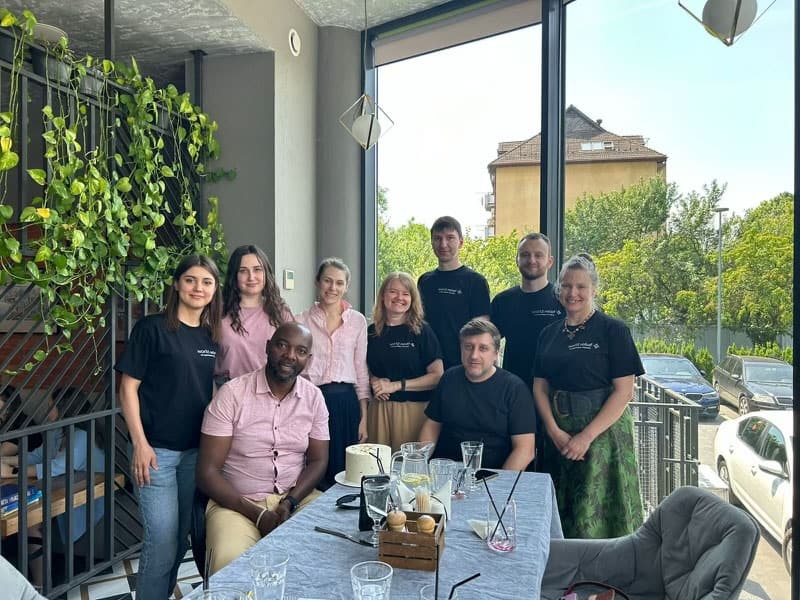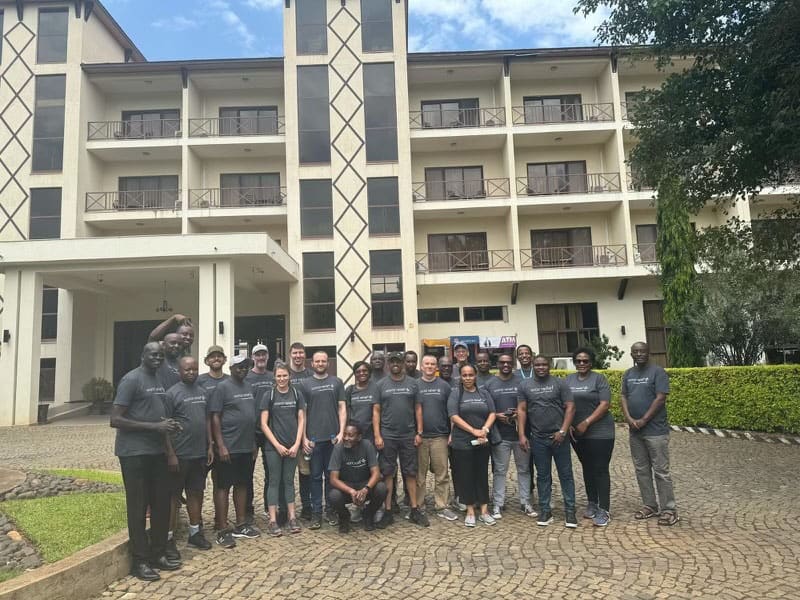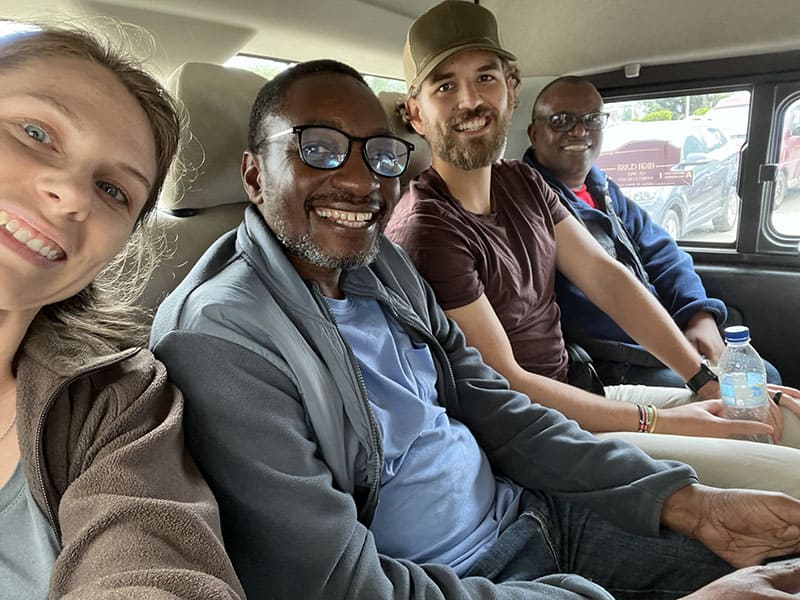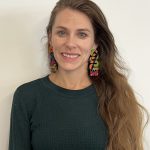Every year around World Humanitarian Day, I’m honored to celebrate our humanitarian staff around the world who are working in some of the most difficult humanitarian crises.
By definition, a humanitarian crisis is generally referred to as an event or series of events that threatens the health, safety and well-being of a community. Natural disasters, war, pandemics and conflict are all factors that can contribute to such a crisis.
In my work as a senior program officer at World Relief, I support our teams in Ukraine, Chad and Democratic Republic of the Congo where we are actively providing psycho-social support to people traumatized by war, conducting food distributions to those displaced from their homes by conflict, welcoming refugees who have fled neighboring countries, helping communities rebuild in the wake of natural disaster and so much more.

WHAT DOES IT MEAN TO DO NO HARM?
As humanitarian response workers, we are guided by the principle of “do no harm” — an approach to humanitarian work that, according to UNHCR, “helps identify unintended negative or positive impacts of humanitarian and development interventions” in these complex settings.
We “do no harm” by understanding the context in which we work, by working in partnership with the community and by implementing community-led responses rather than coming to help with solely our own ideas and interventions. This principle is an essential core value in our work at World Relief, and while I understand this guiding doctrine of “do no harm”, after 10 years of working in the humanitarian world, I still wrestle with one key question — what if my team and I do everything in our power to help the right way, and we still don’t see the change we’ve pushed so hard for? Or worse yet — the situation gets worse?
What do I do when a relatively peaceful Sudan falls to pieces in less than one year’s time, descending into chaos of the likes not seen since the 1980s? What can I say of my efforts when, after more than 30 years of independence, Ukraine must again fight to preserve its national identity, with both sides of the fight calling the warzone a “meat grinder.”
It’s disempowering to see hard-won change rapidly fall apart before your very eyes. And yet – despite knowing these depressing and arresting realities – as humanitarians and followers of Christ, we are still compelled to help.
What kind of humanitarian are you?
The work we do wouldn’t be possible without people like you. Take our quiz to find out what kind of humanitarian you are and where you can play a part in our work at World Relief.
FOUR-YEAR-OLDS IN HAITI
While in South Sudan, my colleague, Karen shared a story with me about her time as a frontline nurse working in complex humanitarian settings. For years, she had provided medical support in some of the world’s most dire locations, and yet, she still recognized the dual nature of her job as a frontline healthcare worker.
After an earthquake struck Haiti in 2010, she made periodic visits to Haiti to help families in the aftermath. She and her team distributed Vitamin A supplements and nutritionally dense foods to children to stave off signs of malnutrition, and deworming tablets to prevent disease and malnourishment.
Once, after Karen made sure a group of chatty four-year-olds with semi-bloated bellies took their dewormer, she watched them do what comes naturally to four-year-olds everywhere — they playfully ran off together and jumped into a slowly moving stream filled with trash and animal feces, all the while splashing and consuming the dirty water filled with the very parasites that had infected them in the first place. In their innocent fun, Karen said she knew that the children would only feel better for a week or so before they became reinfected. As of 2022, 1 in 27 children die before reaching age five, most often because of a preventable or treatable illness, and these children would fare no better. Still, Karen continued to provide dewormers in hopes that some would make it through.

WHAT DO I DO WHEN I DON’T SEE THE CHANGE I LONG FOR?
The Bible is full of heroes and heroines like Karen who sought big change yet saw little fruit during their lifetimes — people like Moses who did the impossible. After growing up in the grandeur of royal Egypt, he led the Hebrew people out of bondage from the very people and place he had called home. He followed God’s vision to lead the people to a promised fertile land where they would grow and prosper.
But, for 40 years this vision was sidetracked, and Moses struggled to keep the Israelite community on track amid their penchant for idol worship, complaining and rampant lack of faith in God. Along the way, he buried his sister, brother and likely his wife and children in undistinguished graves in the barren desert. Ultimately, he met the same fate, and never got to see God’s promise fulfilled by living in the promised land.
Then there’s Mary, a young, Jewish teenager who lived in Roman-occupied Judea. She received the promise of a supernatural birth that would change the course of history. She faced the stigma of a pregnancy out of wedlock, a genocidal King Herod intent on killing their son and uprooting her young family to flee to Egypt as refugees. And yet, Mary and Joseph continued to obey when things seemingly got worse and trusted God with their family’s future despite the unknowns.
Mary heard God’s promise of a big change and believed it. But I wonder if she ever imagined it to be in the form of a gruesome crucifixion of her eldest child, and the stoning to death of another? So, this brings me back to my original question: Despite my hard work to help the vulnerable persons of this world, what if I still don’t see the change or the fruit I was expecting?
I TRUST GOD’S PROMISES
I can only conclude that while God may promise change, he doesn’t promise that I will ever get to see it in my lifetime. And this is where the beautiful fruit blossoms: I can only know that the change will come by trusting that God’s visions, dreams and plans are much bigger than my own.
By trusting in God’s bigger plan, Moses’ followers entered the promised land and established the Israelite homeland where Jesus will one day rule. And by trusting in God’s bigger plan, Mary’s son’s death continues to bring life to countless people whom Mary never saw.
Though we may not see the full fruit of our labor here on earth, I still believe God gives us glimpses into his plan and promise of healing and redemption during our years here on earth.
For example, when I lived and worked in South Sudan, I met Gloria, a young South Sudanese woman who was a cook and cleaner on the compound where I lived. I got to know Gloria and learned she had big dreams and aspirations. Others on the compound noticed her big dreams too, and eventually pooled their resources to pay for her to pursue higher education in a neighboring country.
As a result, Gloria is now living her dreams and running a business selling wedding gowns. I have no doubt that she will one day pay forward the life-transforming generosity she received to some other young girl during her lifetime.
Likewise, Matthew was a security guard who worked on that same compound. He too was financially sponsored by a friend and fellow worker on the compound to receive higher education. This paved the way for him to purchase a house in a safer neighboring country where his young children could grow up outside of the direct effects of war.
Helping Gloria and Matthew didn’t immediately solve the humanitarian crises unfolding in South Sudan. But sometimes, the greatest change we can make is in responding to the needs of those in our immediate circles. Gloria and Matthew were two colleagues we knew and could see that change was developing in their lives. A few humanitarian aid workers from near and afar were able to further the work God was doing in their lives in a very profound way by simply responding to what was right in front of them in love. That type of change will have ripple effects for years to come, I’m sure.

YOU, TOO, CAN BE A HUMANITARIAN ON WORLD HUMANITARIAN DAY
As humanitarians and Christians alike, we are called to “actively engage in promoting human welfare and social reforms ” for those in vulnerable positions. While some of the urgent needs and crises we respond to will not be resolved in our lifetimes, we can all create profound change simply by acting in love to respond to the needs right in front of us — just like those humanitarian aid workers did for Gloria and Matthew, and like I imagine they’ll do for others in their community.
Each day that we as Christ followers get to share love, compassion, kindness and friendship with those who surround us, we open the door for healing and growth in others and in ourselves.
I see this in action every day among my World Relief colleagues around the globe, many who suffer from the traumas of war and conflict themselves. Even as I seek to encourage and empower these individuals, they are doing the same within their own communities. And in this, we find that change isn’t so invisible after all. It’s the simple act of loving our neighbor as ourselves that will have the greatest impact on the world at the end of the day!
This World Humanitarian Day, show your support for humanitarian workers by giving today. Your support enables them to do the work God has called them to do.

Amanda Patterson serves as Senior Program Officer at World Relief with a focus on humanitarian and disaster responses. Most recently she has been engaged with conflict response in Ukraine, Chad and DR Congo. Prior to joining World Relief, Amanda lived a decade overseas and worked with a Christian organization as a responder to refugee and conflict emergencies in Niger, South Sudan, Greece and Ethiopia. She is passionate about creative expression through visual and textile arts, and is inspired by the beauty of woodlands where she is based in Bucks County, Pennsylvania.

